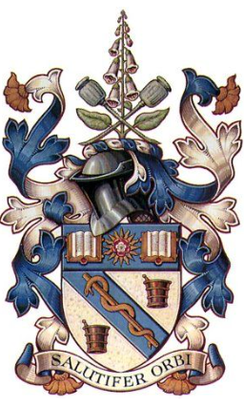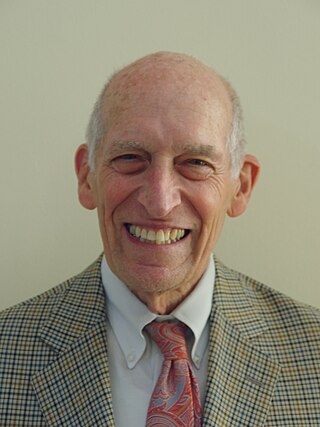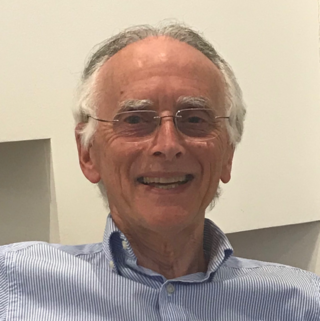This is a list of notable medical and scientific journals that publish articles in pharmacology and the pharmaceutical sciences.

Pharmacology is the science of drugs and medications, including a substance's origin, composition, pharmacokinetics, pharmacodynamics, therapeutic use, and toxicology. More specifically, it is the study of the interactions that occur between a living organism and chemicals that affect normal or abnormal biochemical function. If substances have medicinal properties, they are considered pharmaceuticals.

Fluvoxamine, sold under the brand name Luvox among others, is an antidepressant of the selective serotonin reuptake inhibitor (SSRI) class. It is primarily used to treat major depressive disorder and obsessive–compulsive disorder (OCD), but is also used to treat anxiety disorders such as panic disorder, social anxiety disorder, and post-traumatic stress disorder.

Pharmacy is the science and practice of discovering, producing, preparing, dispensing, reviewing and monitoring medications, aiming to ensure the safe, effective, and affordable use of medicines. It is a miscellaneous science as it links health sciences with pharmaceutical sciences and natural sciences. The professional practice is becoming more clinically oriented as most of the drugs are now manufactured by pharmaceutical industries. Based on the setting, pharmacy practice is either classified as community or institutional pharmacy. Providing direct patient care in the community of institutional pharmacies is considered clinical pharmacy.

The UCL School of Pharmacy is the pharmacy school of University College London (UCL). The School forms part of UCL's Faculty of Life Sciences and is located in London, United Kingdom.

Medicinal or pharmaceutical chemistry is a scientific discipline at the intersection of chemistry and pharmacy involved with designing and developing pharmaceutical drugs. Medicinal chemistry involves the identification, synthesis and development of new chemical entities suitable for therapeutic use. It also includes the study of existing drugs, their biological properties, and their quantitative structure-activity relationships (QSAR).

Bioequivalence is a term in pharmacokinetics used to assess the expected in vivo biological equivalence of two proprietary preparations of a drug. If two products are said to be bioequivalent it means that they would be expected to be, for all intents and purposes, the same.

Mecamylamine is a non-selective, non-competitive antagonist of the nicotinic acetylcholine receptors (nAChRs) that was introduced in the 1950s as an antihypertensive drug. In the United States, it was voluntarily withdrawn from the market in 2009 but was brought to market in 2013 as Vecamyl and eventually was marketed by Turing Pharmaceuticals.
Pharmacotherapy, also known as pharmacological therapy or drug therapy, is defined as medical treatment that utilizes one or more pharmaceutical drugs to improve ongoing symptoms, treat the underlying condition, or act as a prevention for other diseases (prophylaxis).
Modified-release dosage is a mechanism that delivers a drug with a delay after its administration or for a prolonged period of time or to a specific target in the body.
In Denmark, pharmaconomists are experts in pharmaceuticals who have trained with a 3-year tertiary degree. Pharmaconomy describes either their professional practice or their training courses.
Pharmacy in China involves the activities engaged in the preparation, standardization and dispensing of drugs, and its scope includes the cultivation of plants that are used as drugs, the synthesis of chemical compounds of medicinal value, and the analysis of medicinal agents. Pharmacists in China are responsible for the preparation of the dosage forms of drugs, such as tablets, capsules, and sterile solutions for injection. They compound physicians', dentists', and veterinarians' prescriptions for drugs. Pharmacological activities are also closely related to pharmacy in China.
Drug repositioning involves the investigation of existing drugs for new therapeutic purposes.
The American Society for Pharmacology and Experimental Therapeutics (ASPET) is a scientific society founded in late 1908 by John Jacob Abel of Johns Hopkins University, with the aim of promoting the growth of pharmacological research. Many society members are researchers in basic and clinical pharmacology who help develop disease-fighting medications and therapeutics. ASPET is one of the constituent societies of the Federation of American Societies for Experimental Biology (FASEB). The society's headquarters are in Rockville, MD. The current president is Michael F. Jarvis.

Hydroxybupropion, or 6-hydroxybupropion, is the major active metabolite of the antidepressant and smoking cessation drug bupropion. It is formed from bupropion by the liver enzyme CYP2B6 during first-pass metabolism. With oral bupropion treatment, hydroxybupropion is present in plasma at area under the curve concentrations that are as many as 16 to 20 times greater than those of bupropion itself, demonstrating extensive conversion of bupropion into hydroxybupropion in humans. As such, hydroxybupropion is likely to play a very important role in the effects of oral bupropion, which could accurately be thought of as functioning largely as a prodrug to hydroxybupropion.
Aliasger K. Salem is the Associate Vice President for Research at the University of Iowa and Bighley Chair and Professor of Pharmaceutical Sciences at the University of Iowa College of Pharmacy. Salem's academic appointment at the University of Iowa is based in the College of Pharmacy, with additional secondary appointments in the College of Dentistry, Department of Chemical and Biochemical Engineering, Department of Biomedical Engineering, Department of Chemistry, and the Holden Comprehensive Cancer Center. Prior to joining the University of Iowa in 2004, he was a postdoctoral fellow at the Johns Hopkins School of Medicine and completed his PhD at the School of Pharmacy and Pharmaceutical Sciences at the University of Nottingham in the UK.

Leslie 'Les' Zachary Benet is an influential pharmaceutical scientist heading the UCSF's Benet Lab at the Department of Bioengineering and Therapeutic Sciences and recipient of the Remington Medal for distinguished service to American pharmacy.

Malcolm Rowland FBPhS is Emeritus Professor of Pharmacy, University of Manchester, and adjunct professor, University of California San Francisco. His research in pharmacology, has been particularly in physiologically based pharmacokinetics. He has written several textbooks on the subject.

Firazorexton (INNTooltip International Nonproprietary Name; development code TAK-994) is an experimental orexin 2 (OX2) receptor agonist first described in a 2019 patent filed by Takeda Pharmaceutical Company.